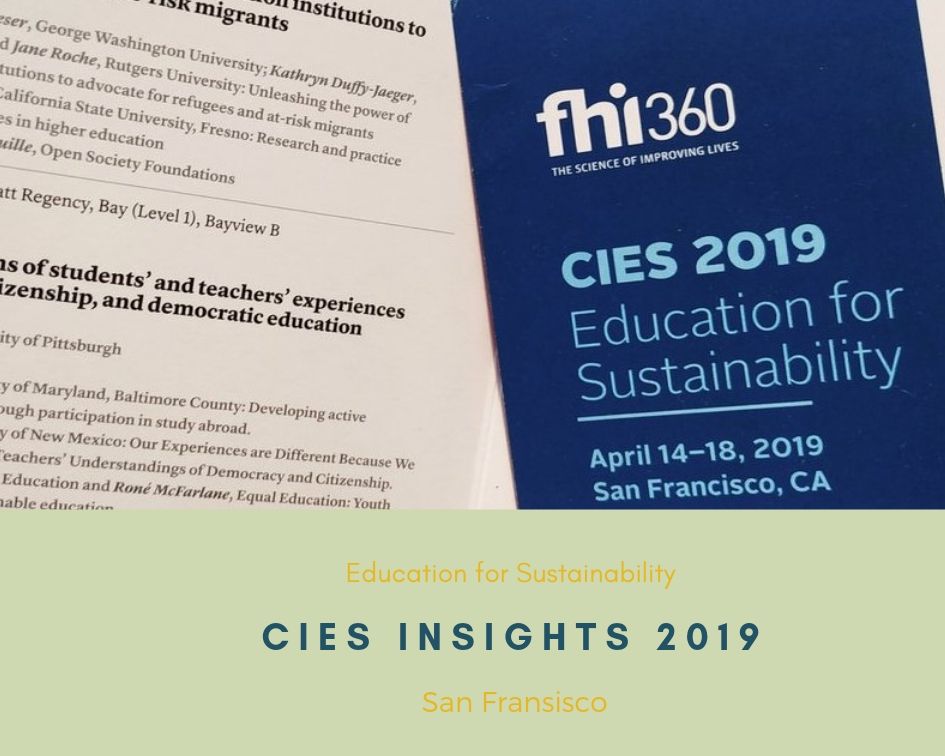[et_pb_section admin_label=”section”][et_pb_row admin_label=”row”][et_pb_column type=”4_4″][et_pb_text admin_label=”Text” background_layout=”light” text_orientation=”left” use_border_color=”off” border_color=”#ffffff” border_style=”solid”]
In April 2019, Dignitas attended the 63rd annual CIES (Comparative and International Education Society) conference in San Francisco. This year, the conference theme was focused on Education for Sustainability, attempting to answer the following question; “What is the longer term cost of an education that promises – and sometimes delivers – productivity, industrialization, modernity and consumption? Who pays this price? What are the larger costs? And with what ultimate consequence for the planet?”
[/et_pb_text][et_pb_text admin_label=”Text” background_layout=”light” text_orientation=”left” use_border_color=”off” border_color=”#ffffff” border_style=”solid”]
Dignitas had the privilege of presenting a paper themed; “Sustainable development in the classroom: developing 21st century skills among students in Nairobi’s informal settlements.”
However, beyond our own presentation, I had the privilege of learning from other projects and research from around the world. It was also a great opportunity to network with like minds, find out what’s new in global education, and to see what might inform Dignitas’ work moving forward.
[/et_pb_text][et_pb_testimonial admin_label=”Testimonial” url_new_window=”off” quote_icon=”off” use_background_color=”on” background_color=”#f2f0ec” background_layout=”light” text_orientation=”left” use_border_color=”off” border_color=”#ffffff” border_style=”solid”]
An area of developing thought that grabbed my attention was the cultural context of learning. I have always strongly felt that context and culture should be amongst the most prominent influences on program design and evaluation, but I was particularly inspired by the work of Matthew Jukes (RTI), presented in the session ’Effective Pedagogy in Cultural Context’ that proposed, I believe rightly so, that we should also be considering culture and context in how we define skills, and the value we place on learning.
[/et_pb_testimonial][et_pb_text admin_label=”Text” background_layout=”light” text_orientation=”left” use_border_color=”off” border_color=”#ffffff” border_style=”solid”]
Further consider the dynamics of post-colonialism, and the role of language, and I believe there are some important questions to be asked. Who defines which skills are important? Who defines the competencies that education should be nurturing? What is the power-play between funders and implementers who each originate from different contexts? What is the power play between implementers and community stakeholders? Even within a shared national culture, how do we negotiate the significant gap between rural and urban? Whose voice is heard in important program and evaluation decisions, and what are the influences over those voices? Can you adopt ‘international best practices’ that transcend local culture and context? Are we ever restricted by the expectations of outside influencers?
[/et_pb_text][/et_pb_column][/et_pb_row][et_pb_row admin_label=”Row”][et_pb_column type=”2_3″][et_pb_text admin_label=”Text” background_layout=”light” text_orientation=”left” use_border_color=”off” border_color=”#ffffff” border_style=”solid”]
We cannot afford NOT to ask these questions. Students, parents, teachers and School Leaders will all respond to programming within a cultural context, outcomes of our programming will be, to some extent, pre-determined by culture and context.
These questions are particularly pertinent when it comes to defining and nurturing 21st century skills. Skills such as collaboration, communication, self-efficacy and curiosity are defined, and their development impacted, by cultural norms and context. For example, one presenter shared that curiosity was more common in children with urban, wealthy, educated parents
[/et_pb_text][/et_pb_column][et_pb_column type=”1_3″][et_pb_testimonial admin_label=”Testimonial” url_new_window=”off” quote_icon=”off” use_background_color=”on” background_color=”#ced8ba” background_layout=”light” text_orientation=”left” use_border_color=”off” border_color=”#ffffff” border_style=”solid”]
Communication
Collaboration
Curiosity
Self-efficacy
[/et_pb_testimonial][/et_pb_column][/et_pb_row][et_pb_row admin_label=”Row”][et_pb_column type=”4_4″][et_pb_text admin_label=”Text” background_layout=”light” text_orientation=”left” use_border_color=”off” border_color=”#ffffff” border_style=”solid”]
Further, how does culture manifest itself in the classroom? How does culture shape teaching and learning? In addition to this, a language barrier often automatically leads to a cultural barrier yet is rarely acknowledged.
In all that we do, Dignitas must ensure that, while informed by experiences in other times and places, that it is, above all else, relevant in our context, relevant and impactful in this time and place.
[/et_pb_text][et_pb_text admin_label=”Text” background_layout=”light” text_orientation=”left” use_border_color=”off” border_color=”#ffffff” border_style=”solid”]
Contributor: Deborah Kimathi – Executive Director
[/et_pb_text][/et_pb_column][/et_pb_row][/et_pb_section]

